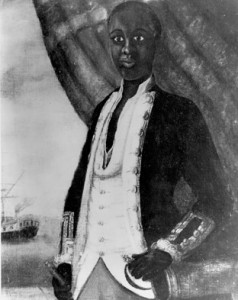 Nearly two hundred years before the 1963 March on Washington for Peace & Jobs and before Richard Allen, Fredrick Douglas, Harriett Tubman, WEB Dubois, Rosa Parks, Malcolm X and Martin Luther King, there was an African man who brought vision, intelligence, and leadership to the cause of African liberation and equality in 18th century America. John Quamino was born in 1744, most likely in Anomabu, a small town on the Gold Coast of West Africa which is today Ghana. His Quamino name is the English phoneticized pronunciation of Kwame coming from the Akan people’s tradition of providing the day name for boys born on Saturday. Arriving in Newport, Rhode Island around 1754, his own account describes his father, a prominent member of his tribe entrusting his son to a white merchant to be brought to America for education and was promptly enslaved and sold to a Benjamin Church of Rhode Island. While a slave in Newport, Quamino had access to both education and religion and became an active member in the First Congregational Church. He married an African woman named Duchess who was enslaved in the William Channing household, and in 1773, Quamino would purchase his freedom from the proceeds of a town lottery winning.
Nearly two hundred years before the 1963 March on Washington for Peace & Jobs and before Richard Allen, Fredrick Douglas, Harriett Tubman, WEB Dubois, Rosa Parks, Malcolm X and Martin Luther King, there was an African man who brought vision, intelligence, and leadership to the cause of African liberation and equality in 18th century America. John Quamino was born in 1744, most likely in Anomabu, a small town on the Gold Coast of West Africa which is today Ghana. His Quamino name is the English phoneticized pronunciation of Kwame coming from the Akan people’s tradition of providing the day name for boys born on Saturday. Arriving in Newport, Rhode Island around 1754, his own account describes his father, a prominent member of his tribe entrusting his son to a white merchant to be brought to America for education and was promptly enslaved and sold to a Benjamin Church of Rhode Island. While a slave in Newport, Quamino had access to both education and religion and became an active member in the First Congregational Church. He married an African woman named Duchess who was enslaved in the William Channing household, and in 1773, Quamino would purchase his freedom from the proceeds of a town lottery winning.
With a strong belief and desire to bring the Christian faith to the Africans, Quamino’s pastor, Reverend Samuel Hopkins raised a considerable sum of money from various New England church groups with plans to educate and train as missionaries two Newport Africans for the purpose of sending them back to Africa. On November 22, 1774 John Quamino along with a Bristol Yamma of Newport were sent to the College of New Jersey (now Princeton University), possibly being the first Africans to enroll in an American college. Hopkins also reached out to a Reverend Phillip Qarque, an African missionary from the Society of London for the Prorogating in Foreign Parts, who was stationed at the Cape Coast Castle in Ghana. Amazingly, Qarque had also made contact with John Quamino’s uncle and mother who were from a prominent family in Anomabu and were excited to reunite with their long lost relative thought to have been lost to slavery. With the commencement of the American Revolution and the soon to be British occupation of Newport, the plans for an African led mission to West Africa ended. Quamino undeterred, redirected his efforts to end slavery in America and promote the social and religious well-being of his fellow Africans.
Quamino would send a June 6, 1776 letter to Quaker and Abolitionist Moses Brown of Providence thanking him for his courage to free his slaves and take on the abolition of slavery, where he stated:
“Having some late understanding of your noble and distinguished character and boundless benevolence—with regards to the unforfeited rights of the poor unhappy Africans of this province and of your sundry petitions to the General Assemblies in their favor, has excited one of that nation, though an utter stranger, to present—gratitude and thanks before you—for all your excellent endeavours for the speedy salvation of his poor enslaved countrymen, and for what you were kindly disposed to do already of this kind in freeing all your servants. Hoping that you will be highly rewarded hereafter by Him who has promised to remember the merciful at the great reckoning day.â€
Soon after, Quamino, like many free Africans would enlist on an American Privateer to earn enough funds to purchase the freedom of his wife and children. Regrettably, he was killed in battle during the American Revolution. The legacy of John Quamino can be seen throughout American civil rights history through those that actively led the efforts for freedom, civil rights and equality, but few paid the ultimate price like John Quamino who gave his life to a fledging America in the name of freedom and equality for all.
-KS
- Africans in Newport History Celebration - July 23, 2014
- Gilded Age Newport in Color - June 12, 2014
- A Dialogue Between Two African Women - December 20, 2013




Thanks for another informative web site. The place else
could I get that kind of info written in such an ideal means?
I’ve a project that I’m just now working on, and I’ve been on the
look out for such info.
Have you ever considered publishing an e-book or guest authoring on other websites?
I have a blog based upon on the same subjects you discuss and
would really like to have you share some stories/information. I know my readers
would value your work. If you are even remotely interested, feel free
to shoot me an email.